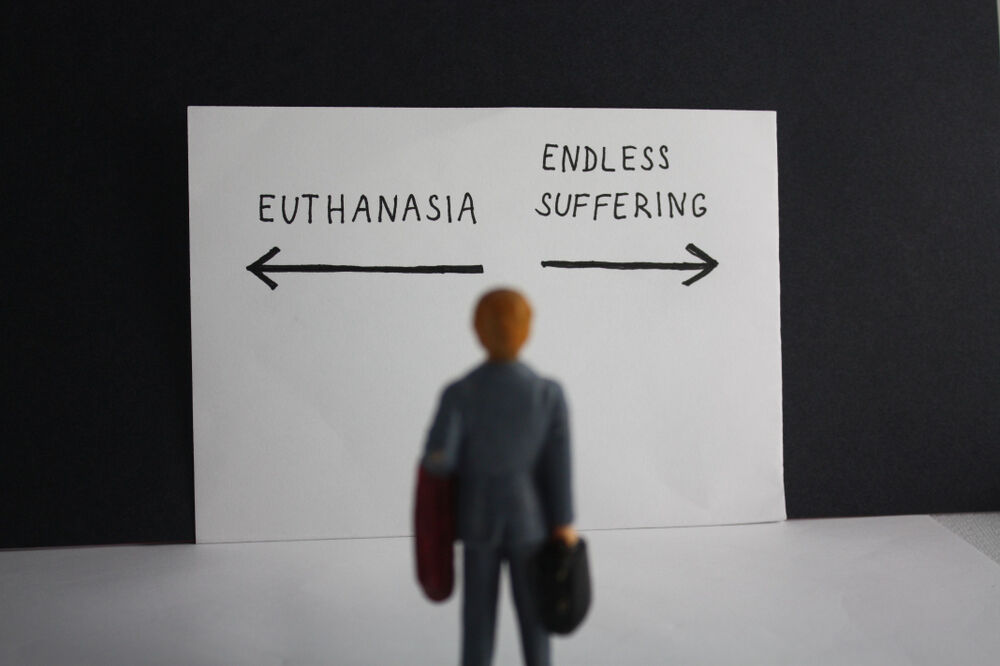Is Assisted Suicide Inevitable?

This week, MP Kim Leadbeater introduced her private members bill to introduce assisted suicide across England and Wales. The text of the Terminally Ill Adults (End of Life) Bill has not yet been published, but I’d expect it to come in the next few weeks. The Bill had its First Reading which is when it is formally introduced in Parliament. The big moment will come on 29 November, when MPs will debate the general principles of the Bill and likely vote on it at Second Reading.
It was at this same point in 2015 that MPs voted against the Assisted Dying Bill (No 2) in the name of Rob Marris MP, defeating it by 330-118. Back then, I was fairly confident the legislation would be rejected, despite the plethora of opinion polls that seemed to suggest mass public support. MPs are often persuaded by public safety arguments and we knew from MP intelligence that a sizeable number were at least hesitant, if not completely opposed to the Bill.
But nine years is a long time in politics. Since that last assisted suicide vote we have had three General Elections and a referendum. Following Labour’s landslide back in July, there are hundreds of new MPs who’s views on this issue are unknown. And this time we know No 10 pressurised Kim Leadbeater into bringing this bill forward and the PM, Sir Keir Starmer, is a known supporter of assisted suicide.
All of this means we must face reality. It is possible, (some would even argue inevitable), that the Leadbeater Bill passes its Second Reading on 29 November. One big question that we must ask is what happens next? Does passing Second Reading guarantee the legislation becomes an Act of Parliament and the law of the land?
Parliamentary Process
Like any piece of legislation, the Bill must pass through all the stages a parliamentary bill must complete. If it passes Second Reading, it will move to Committee Stage. This is a line by line examination of the Bill, normally within a few weeks of the legislation passing second reading. Most bill are dealt with by a Public Bill Committee, made up of a cross-party group of MPs, weighted towards the party with the largest number of MPs.
They can take evidence from experts and interest groups outside parliament. Amendments can be proposed and the chairman of the committee will select some amendments for discussion. Sometimes bills are dealt with by a Committee of the whole House with every MP able to take part.
After Committee Stage comes Report Stage. This is when the amended bill comes back to the whole House and all MPs can give it further consideration. Further amendments can be put forward. It is up to the government to make time for Report Stage amidst other government business.
Then comes Third Reading. This is the last chance for a debate to take place on the contents of the Bill in the Commons. It normally happens right after Report stage on the same day. Debate is usually short and limited to what is actually in the Bill, rather than debating what might or should have been included. No amendments can be put forward at this stage and MPs must vote on the Bill at the end of the debate.
If it passes, it will go to the House of Lords for its First Reading (formal introduction of the Bill). Once in the Lords, it will have its Second Reading, Committee Stage where further amendments can be made, then Report Stage, Third Reading before going back to the Commons.
You then enter a period known as ping pong when MPs might delete Lord amendments and send the Bill back. This might happen several times over several days. Once both Houses are agreed, the Bill can receive Royal Assent and becomes an Act of Parliament. Convention dictates that the Commons takes priority over the Lords.
What does this mean?
The point here is that even if the Bill passes second reading in the Commons on 29 November, that does not mean it is guaranteed to become law. It is still theoretically possible for the legislation to be blocked and defeated at subsequent stages, however unlikely.
Moreover, the space for amendments means you can probe and continue to put pressure on supporters of the legislation to answer key questions. You can try and ensure more safeguard and look to guarantee conscientious objection rights for any medical professionals who do not want to participate. You might also try and secure more funding for palliative care.
There is also the time element. The Bill came no 1 in the ballot which means it has more time for debate than any other private member bill. However, each parliamentary stage takes time. And giving the bill time in the parliamentary calendar is in the gift of the government. They will need to ensure they free up time while parliament is sitting.
Could the bill run out of time? Theoretically yes, but this parliamentary session could last years and so it would be quite extraordinary if it didn’t make it through the various stages.
What happens if it becomes law?
Once the Bill becomes an Act of Parliament, I suspect there will be a delay before it becomes operational. This is to ensure everything is put in place to make it possible. Guidelines will need to be drawn up and protocols, plus the reporting system (presuming there is one) will need to be set up as well.
In theory once this time has elapsed, patients who meet the criteria can start choosing an assisted suicide should they so desire and so long as any necessary parties – like a doctor and a high court judge – agree.
But let’s also be clear that in a few years after the law is implemented, you can expect to see parliament debating fresh criteria for eligibility and whether all the safeguards are really needed. That is the pattern in other places around the world that have legalised assisted suicide. Even before the Leadbeater Bill reaches Second Reading, a group of MPs have already pushed for the expected eligibility criteria (most likely a mentally competent adult with a terminal illness or six months or less to live) to be broader and wider.
This is called the slippery slope argument and it has two key elements. Firstly, we will see the number of people choosing assisted suicide increase. Secondly, we will see criteria expanded and safeguards eroded. Since this has happened elsewhere – Canada, the Netherlands, Belgium, Switzerland, Washington State etc…- I see no reason why it will not happen here. Naively saying we’ll do it better is both arrogant and wrong.
Speak the truth in love
But there is another part of this debate that is wholly wrong. And that is the misleading and frankly manipulative language that is employed by supporters of assisted suicide. The Bible says we should speak the truth in love (Ephesians 4:15). Part of obeying this command means calling things what they are.
There are four examples of deceit practiced by some key supporters of assisted suicide and it is important you know what they are.
Firstly, they deliberately employ words like ‘safety’, ‘choice’ and ‘protection’ to try and persuade you that the bill is entirely without risks. Kim Leadbeater has claimed this bill will allow us to “see out our days surrounded by those we love and care for, knowing that when we are gone they can remember us as we would like to be remembered.”
Philosopher Kathleen Stock hits the nail on the head when she commended that such language make it sound “as if one is being offered a particularly relaxing spa treatment. With a pleasing ring of supportiveness, you are now being assisted in achieving something rather than being killed by a doctor or killing yourself.”
Even the name of the bill – End of life – is deliberately chosen to mask and obscure reality. What is being proposed is assisted killing, nothing more or less. It is assisting someone to take a lethal drug and commit suicide. It is wholly wrong to call this Bill anything else.
So I plead with you: do not call it assisted dying. You must understand where such language has come from. Do not give into using it. Call the Bill what it really is.
An alternative reality?
There is a second deceit at play here. Professor John Wyatt was a consultant with the NHS for 20 years. In a recent article, he argued that supporters of assisted suicide like to paint an alternative reality. They like to pretend that all individuals can make autonomous decisions about ending their own lives calmly and rationally. They casually dismiss the possibility of coercion or abuse taking place.
The truth is that we are not nearly as rational or autonomous as we like to think. We are subject to a wide range of social and psychological factors, sometimes without us even knowing. We do not make decisions in isolation from its impact on others. As the saying goes, ‘no man is an island’.
Do we honestly think that coercion and abuse will not come into it? Can we guarantee that everyone who seeks an assisted suicide really is making the decision free from pressure? In the state of Oregon, more than 40% of those who end their lives through physician assisted suicide provide ‘burden on family, friends or caregivers’ as a reason for choosing an assisted suicide.
Our NHS is creaking at the seams. People are living longer and the cost of social care is only going to increase. Given that assisting someone to kill themselves costs so much less than providing care at home, hospital or hospice, are we completely confident economics will not come into decision making for patients and doctors?
A false choice?
The third deceit is from Kim Leadbeater herself. She wrote in the Guardian that someone with a terminal illness only had bad options. Either they suffer in misery. Or in great pain they travel to Dignitas in Switzerland.
This is a false choice and dichotomy. She completely failed to mention palliative care and medicine. This is a highly effective, holistic form of end of life care which in nearly all cases can give people a dignified death. As Professor Wyatt says, ‘despite woeful underfunding and neglect, broken Britain still has the best palliative care services in the world.” So let’s prioritise that, rather than state-sanctioned killing of the most vulnerable in our communities.
True Compassion
The final deceit is the idea that when responding to suffering at the end of life we must offer assisted suicide because this is a compassionate response to pain at the end of life.
Here is yet another example of the duplicitous approach adopted by supporters of assisted suicide. We should be unequivocal in our position. It is never compassionate to offer lethal drugs in response to suffering or terminal illness. There is no scenario or situation where this is the right thing to do. God’s word says we must not murder (Exodus 20:13) and that God alone grants and takes life (1 Samuel 2:6).
This might sound very uncompassionate. But stop and think about what the word compassion actually means. It means to suffer with and alongside. True compassion affirms something profound about the individual who is suffering. As philosopher Josef Pieper said, compassion says to the person: it is good that you exist. It is good you are in the world. By contrast, assisted suicide says the complete opposite. It says it would be better if you did not exist and were not in this world.
True compassion offers life affirming treatment and support. We walk alongside the sufferer, believing that no suffering is ever, ultimately meaningless. We gently and graciously and patiently love and care for our loved one or friend right to life’s natural end. This is how God intended it to be.
We are commanded to do good to all (Galatians 6:10), especially to those in the household of faith. When it comes to assisted suicide, doing good means calling things what they really are, resisting manipulative language and being clear about what true compassion is.
Prayer and action
The final thing I’ll say is that the legalisation of assisted suicide is not inevitable. The secret things belong to God (Deuteronomy 29:29). If the Lord’s will is that this Bill fails, then fail it will (Isaiah 14:24). We can and should pray that MPs will reject the legislation, if not at Second Reading, then at subsequent stages.
Whatever happens, this is a great opportunity for God’s people to be salt and light (Matthew 5:13-16) by telling a better story about suffering and death. Who knows what evangelistic opportunities might arise over the coming weeks? May God grant us courage, boldness, wisdom and favour as we represent Him.






